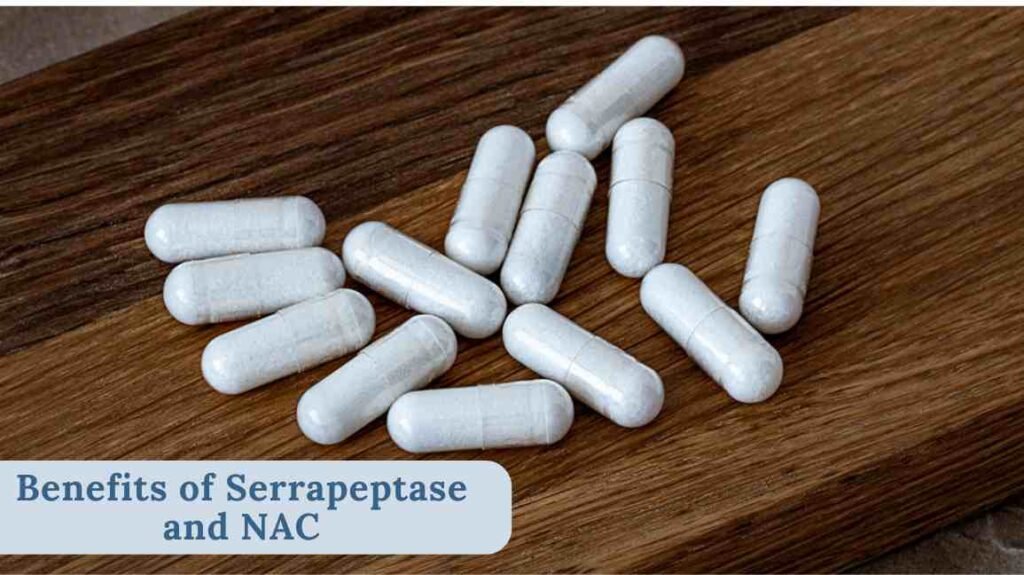Serrapeptase and N-acetylcysteine (NAC) are two compounds that have caught the attention of the health and wellness community for their amazing benefits.
Serrapeptase, a proteolytic enzyme, is known for its ability to reduce inflammation and pain. On the other hand, NAC, which helps make the antioxidant glutathione, is revered for its role in supporting respiratory health and its detoxifying properties.
Can we mix these two supplements safely? In this blog post, we’ll check out what Serrapeptase and NAC can do on their own and see if they work well together to make you healthier or if there could be risks when you take them together.
What is Serrapeptase?
Serrapeptase, also known as serratiopeptidase, is an enzyme made by bacteria in silkworms’ guts. It’s an old medicine and now people take it as a supplement for different health reasons.
How it works
Serrapeptase is classified as a proteolytic enzyme, meaning it helps to break down proteins into smaller components (proteolysis). This property is key to its mechanism of action in the body, where it has been suggested to support circulatory and respiratory health by helping in the dissolution of mucus and reducing inflammation.
Uses and Benefits of Serrapeptase
Here are some of the health benefits associated with serrapeptase:
- Helps reduce inflammation and pain
- Supports respiratory health by breaking down mucus and reducing congestion
- May improve circulation by breaking down arterial plaque
- Lowers the risk of a heart attack or cardiovascular disease.
- Treats bacterial infections.
- Has been shown to have anti-bacterial, anti-viral, and anti-inflammatory properties
- Tooth extraction and surgeries.
In addition to these benefits, serrapeptase has also been linked to improving conditions like chronic sinusitis, fibrocystic breast disease, carpal tunnel syndrome, and ear, nose, and throat infections.
Possible Side effects
While serrapeptase offers several health benefits, it’s important to be aware of its potential side effects. These may include:
- digestive discomfort
- nausea
- stomach upset
- loss of appetite
- skin rash
- cough
- blood clotting disturbances
- allergic reactions
- muscle & joint pain
If you experience any of these side effects, it’s best to discontinue use and consult with your healthcare provider.
Also Read: What are the Serrapeptase side effects on the liver?
What is N-acetylcysteine (NAC)?
N-acetylcysteine (NAC) is a powerful drug approved by the Food and Drug Administration (FDA) that serves as a precursor to glutathione, one of the most crucial antioxidants in the human body.
Derived from the amino acid L-cysteine, NAC has a significant impact on both health and wellness, especially in terms of detoxification and respiratory health.
How it works
NAC exerts its effects primarily through its ability to boost the production of glutathione. Glutathione plays an important role in neutralizing free radicals, reducing oxidative stress, and supporting the detoxification of harmful substances in the liver.
Additionally, NAC can help dissolve mucus which makes it easier to expel. This is particularly beneficial for those who have face respiratory issues like chronic bronchitis, asthma, or cystic fibrosis.
Uses and Benefits of NAC
NAC is widely known for its health benefits, which include:
- Supporting liver health and detoxification processes
- Enhancing respiratory health by thinning mucus in the airway
- Serving as a potent antioxidant to combat oxidative stress and reduce inflammation
- Offering protection against chronic diseases and conditions linked to oxidative damage
- Potentially aiding in the treatment of psychiatric disorders and addictive behaviors due to its effects on neurotransmitters
Possible Side Effects
While NAC is generally well-tolerated, some individuals may experience side effects, including:
- Nausea and vomiting
- Diarrhea
- Constipation
- Rash
- Fatigue
- Headache
In rare cases, NAC can cause an allergic reaction. If you experience symptoms like difficulty breathing, swelling, or severe rash, it is important to seek immediate medical attention.
NAC’s ability to enhance antioxidant levels, support detoxification, and improve respiratory health, makes it an invaluable supplement for many.
However, you should consult with a doctor before starting NAC, especially if you have existing health conditions or are taking other medications.
Can you take Serrapeptase and NAC together?
Yes, Serrapeptase and NAC can be taken together without any major issues. In fact, combining these two supplements may offer even greater benefits than taking them separately.
Serrapeptase’s anti-inflammatory properties and NAC’s potency in boosting glutathione and respiratory health make them a potentially powerful duo for supporting overall health, especially in inflammatory and respiratory conditions.
However, it’s also important to consult with a healthcare provider before starting any new supplement regimen, especially if you have existing health conditions, to tailor advice to your personal health needs and to ensure that there are no potential interactions with other medications you may be taking.
Factors That Affect Drug Interactions
When considering the combination of supplements like Serrapeptase and NAC, it is crucial to understand the factors that influence drug interactions.
1. Metabolic Pathways: Serrapeptase and NAC are processed in the liver. If two things are broken down the same way, they might compete for processing, leading to higher levels in the blood.
2. Binders and Fillers: Check supplement labels for binders, fillers, or inactive ingredients that may affect absorption or cause reactions. Choose high-quality, pure formulations to minimize issues.
3. Health Conditions: Individual health issues can affect supplement responses. For example, if you have a liver problem, be careful with liver-processed supplements. Get personalized advice from a healthcare provider based on your health profile.
4. Dosages: When taking Serrapeptase and NAC together, the right dosages are key. Start low, follow recommendations, and adjust with professional guidance.
With proper guidance, using Serrapeptase and NAC together can boost your health. Remember to consult a healthcare provider before starting any new regimen for safety.
Also Read: Does Serrapeptase Cause Hair Loss?
Benefits of Serrapeptase and NAC

When combined, Serrapeptase and NAC present a synergy that may amplify their respective health benefits. Below are some key points highlighting the combined advantages of taking these supplements together:
- Better Breathing: Both supplements help to thin mucus and help get rid of it, which could really help people with conditions like asthma, chronic bronchitis, and cystic fibrosis.
- Strong Antioxidant Help: NAC boosts glutathione levels and Serrapeptase fights inflammation, giving good help against stress and swelling, keeping cells healthy and protected.
- Healthier Blood Flow and Heart: Serrapeptase breaks down plaque in arteries and boosts blood flow, while NAC protects the heart from damage with its antioxidants, which may lower heart disease risk.
- Cleansing Support for Liver: NAC is great at helping the liver clean out harmful stuff. Teaming up with Serrapeptase, could reduce liver inflammation and keep the liver working well.
- Boost for Immune System: Together, Serrapeptase and NAC help fight inflammation, boost antioxidants, and reduce mucus, supporting a strong immune system that can help the body fight infections and sickness.
Potential interactions or effects when taking them together
While both supplements complement each other, it is important to be aware of potential interactions or effects when taking them together.
1. Monitor for Increased Bleeding Risks: Both supplements may influence blood clotting. If you’re on blood thinners or have a bleeding disorder, monitor closely for any signs of increased bleeding.
2. Watch for Allergic Reactions: Although rare, combining these supplements may raise the risk of allergic reactions. Monitor the symptoms like rash, itching, or swelling, and seek medical attention if they occur.
3. Potential for Lowering Blood Pressure: Serrapeptase may lower blood pressure. Combined with NAC, this effect could be enhanced. If you have low blood pressure or are on medication to lower blood pressure, monitor your levels and symptoms carefully.
4. Liver Enzyme Levels: Both supplements are metabolized by the liver. Regular monitoring of liver function tests is advised, especially if you have existing liver conditions or are taking other medications that affect liver health.
5. Digestive System Reactions: Taking Serrapeptase and NAC together may affect the digestive system, leading to symptoms such as stomach upset, nausea, or diarrhea. Starting with lower doses and gradually increasing may help minimize these effects.
Precautions and Recommendations
Before adding Serrapeptase and NAC to your supplement regimen, it’s important to consider the following precautions:
- Before you try new supplements like Serrapeptase and NAC, it’s important to check with your doctor. They can make sure these supplements are safe for you and won’t cause problems with any medications you’re on.
- Because there could be side effects, it’s best to begin with low doses of Serrapeptase and NAC.
- Keep an eye on how your body reacts to these supplements. If you notice any problems like more bleeding, allergies, blood pressure changes, or liver issues, get medical help right away.
- Pick trusted brands of Serrapeptase and NAC that clearly show what’s inside, and how strong it is, and have few additives.
- If you have a history of bleeding issues, low blood pressure, or liver problems, or are taking certain medications, be extra careful with these supplements. There’s a higher risk of complications for these individuals.
Conclusion
When you combine Serrapeptase and NAC, you could get some pretty great health benefits like easier breathing, less inflammation, and a happier liver.
But, like with any supplement, it’s crucial to talk to a doc before you start, especially if you already have health issues or take other meds.
Go slow with the doses, watch how your body reacts, and choose supplements that are simple and pure. Being careful and informed can help you make the most of these supplements safely.
FAQ
Can I take Serrapeptase and NAC together if I am pregnant or breastfeeding?
It’s best to avoid taking Serrapeptase and NAC together if you are pregnant or breastfeeding unless expressly advised by a healthcare professional. These supplements have not been thoroughly studied in pregnant or breastfeeding populations, and their potential effects on the baby are not well understood.
Can Serrapeptase and NAC help with sinus issues?
Yes, both supplements can help with sinus congestion due to their mucolytic properties. However, it’s important to consult with your doctor before using them for this purpose.
How long does it take for serrapeptase to work on scar tissue?
It takes about 4-6 weeks for serrapeptase to break down scar tissue and reduce its appearance. However, results may vary depending on the severity of your scar and individual response to the supplement.
Can Serrapeptase and NAC interact with other medications?
Yes, Serrapeptase and NAC can interact with other medications due to their blood-thinning and blood pressure-lowering properties. For instance, if you’re taking anticoagulant medications, such as warfarin, there’s an increased risk of bleeding.
Similarly, if you’re on medication for high blood pressure, combining it with these supplements could cause your blood pressure to drop too low. So, it’s crucial to consult with your healthcare provider before adding Serrapeptase and NAC to your regimen, to avoid adverse interactions with your medications.
Resources
- NIH: N-Acetylcysteine (NAC): Impacts on Human Health
- WebMD: Health Benefits of Serrapeptase
- Medical News Today: What are the benefits of NAC

Dr. Usman is a medical content reviewer with 12+ years of experience in healthcare research and patient education. He specializes in evidence-based health information, medications, and chronic health topics. His work is based on trusted medical sources and current clinical guidelines to ensure accuracy, transparency, and reliability. Content reviewed by Dr. Usman is for educational purposes and does not replace professional medical advice.
